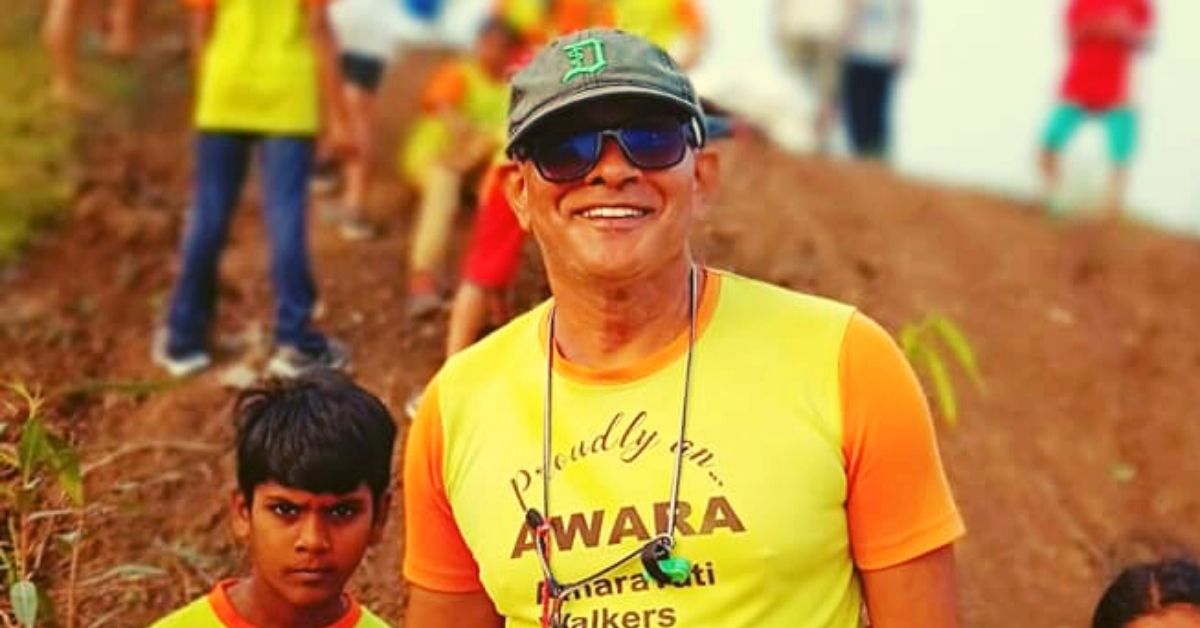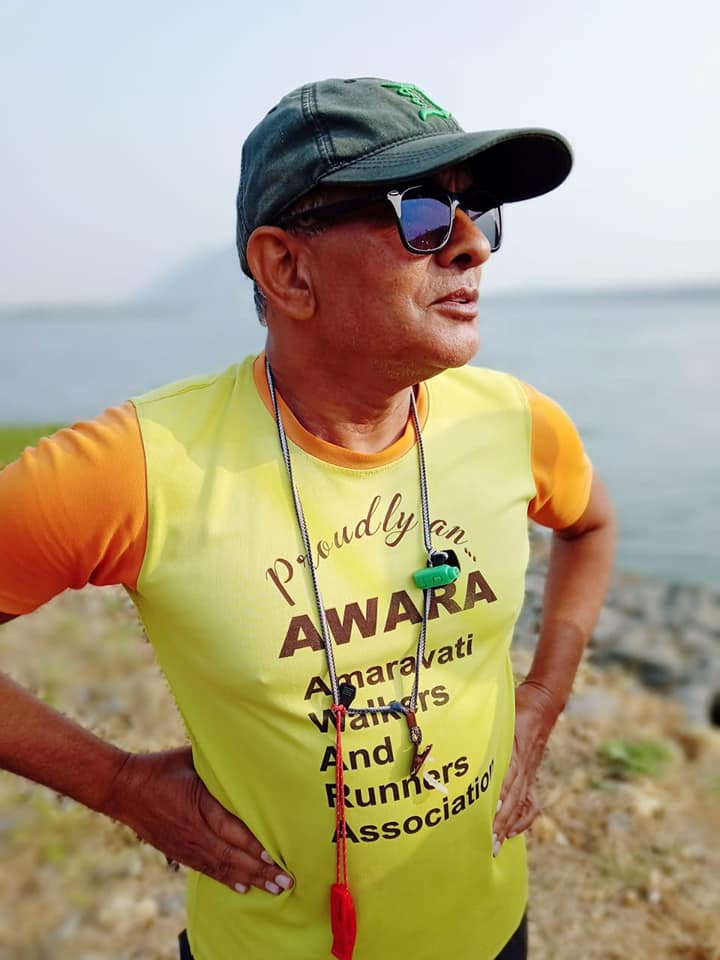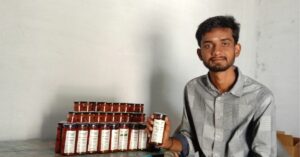57-YO Retd Professor Takes On Sand Mafia, Leads Movement To Revive Krishna River
On the one hand, where most of us are silent about environmental degradation, people like Katragadda are proof that even the efforts of ordinary citizens, can lead to significant and long-lasting change.

Roads littered with garbage, overflowing bins, the incessant honking of vehicles and a beloved river clogged with waste. This is the sight that welcomed Ajay Katragadda when he relocated to his hometown Vijaywada in Andhra Pradesh, from Australia.
Now, he had two options—move back to Australia or stay and adjust. The retired professor chose the latter option and went a step further—he decided to actively work towards changing the situation.

Today, seven years later, from fighting the sand mafia and open defecation to reviving the Krishna river, which is the city’s lifeline and a major source of drinking water, Katragadda has worked hard towards improving the cleanliness situation of Vijaywada.
And he is proud that he chose to stay back.
“Waste is not confined only to the bins. The unfortunate reality is that it is found in our entire eco-system—water, animals, food and thereby in our body! We do not understand the implications of burning waste or the fact that plastic waste is slowly killing our planet. As citizens, we have to be responsible for our actions,” Katragadda tells The Better India.
Running Towards Cleanliness
Every story of change begins with a small step, but in Katragadda’s case, it was running.
A marathon runner, he tried very hard to ignore the garbage lying on the roads he ran on, but the sight of waste in the once beautiful Krishna river did not settle well with him.

Instead of approaching the local municipal corporation to register a complaint, Katragadda took the matters in his own hands.
“I had no plans of starting a mass drive; all I wanted was a clean place to run. One day I just kept a plastic bag in my pocket, and while returning from the run, I collected the waste on my way near the river,” he states.
Within a few days, the other runners and locals residing near the banks of the river got curious about the man who was collecting waste, loading it in his car and driving away.

Learning about Katragadda’s intentions, a couple of other runners joined him, and in the next six months, the number rose to 100.
While there were supporters, there were people who mocked his efforts as well. “The locals failed to see how we were promoting healthy living by running and cleaning the river. They mocked us and called us insane. Fortunately, the taunts did not disrupt our work,” he shares.

Cleaning the 2.5 km river stretch was a daunting task, and after every cleanup, the area would be filled up with waste again.
It took the running group—they call themselves ‘Amaravati Walkers and Runners Association (AWARA)—nearly seven years to clear four feet tall heap of plastic waste from the entire stretch.
While the group managed to convince the bank dwellers to avoid throwing their litter in the river, there was no way to stop people from discarding waste from the overhead bridge. So, now the group carries out the cleanup drives every Sunday.
“Over a period of time, we noticed that the numbers of cleaners became higher than people who dump waste. This is how we knew that the efforts were working,” he mentions.

On average, the volunteers of AWARA clear ten sacks of waste in every cleanup drive and so far they have removed hundreds of tonnes of waste from the river, its surrounding areas and three of the city parks.
After clearing the waste, the volunteers accumulate the trash in a corner, which is then lifted by the municipal corporation.
To engage the younger generation, AWARA also conducts marathons and walkathons where prizes are given to the person who collects most waste.

“It is such so good to see teens fighting over who has collected the most garbage. These marathons fulfil two targets: a fit body and waste-free environment. We have people from every stratum of the society—doctors, lawyers, businessmen, students, engineers and elderly.”

To ease the garbage lifting process, every volunteer is given a stick with a sharp edge, so that they can complete the task without coming in contact with the garbage.
Fighting Open Defecation and the Sand Mafia
Open defecation on the river bank and illegal sand mining were two other significant problems that the volunteers noticed.
To end open defecation, Ajay stationed the volunteers in various places, who questioned every person who was defecating about the nearest toilet facility.
It sounds basic, but a majority of these people disappeared within a week thinking the volunteers were from the government. However, when some of them resorted to physical fights, the AWARA volunteers started shaming them in public.
But then there was a bigger foe—the illegal sand mafia.

“Sand plays a significant role in maintaining the ecology of a river. The sand mafia would come, dig holes and steal sand. It is challenging to put back the sand once it is removed. A couple of times we stopped them from leaving and eventually they got the message,” says Katragadda.
For the ones who still did not comply, the volunteers formed a human circling them and did not allow them to leave until they would put back the sand in the pit they dug.
“We received plenty of threats from them. But we did not budge from our stance, and were eventually able to get them to stop,” says Kattragada.
“What impressed me about Professor Kattragada was his passion for both human fitness and environmental protection. He and his AWARA friends have unconditionally taken care for their beloved Krishna river and worked tirelessly to keep it clean. I wish people from every village and city follow in their footsteps,” says Mumbai-based botanist and water specialist Ajit Gokhale, who has seen the movement right from the beginning, to TBI.

Being The Change We Want to See
As my interview came to an end, I couldn’t help but ponder over a dialogue from Swades, a hindi movie.
‘Hum sab ek doosre ko dosh de rahe hai … jab ki sachchai yeh hai ki … hum sab hi doshi hai’ (We blame each other, but the truth is that all of us are at fault)
Just like Shah Rukh Khan’s character Mohan, Katragadda was dejected after seeing the issues plaguing his hometown. He could have blamed the river pollution and littering on locals, but instead, he chose to take responsibility. He could have returned to Australia, but instead of using his expertise and efforts for the betterment of another country, he tried to improve the conditions back home.
On the one hand, where most of us are silent about environmental degradation, people like Katragadda are proof that even the efforts of ordinary citizens, can lead to significant and long-lasting change.
Also Read: This Tamil Nadu Crusader Has Planted Over 1.3 Lakh Trees in 20 Years!
(Edited by Gayatri Mishra)
Like this story? Or have something to share?
Write to us: [email protected]
Connect with us on Facebook and Twitter.
If you found our stories insightful, informative, or even just enjoyable, we invite you to consider making a voluntary payment to support the work we do at The Better India. Your contribution helps us continue producing quality content that educates, inspires, and drives positive change.
Choose one of the payment options below for your contribution-
By paying for the stories you value, you directly contribute to sustaining our efforts focused on making a difference in the world. Together, let's ensure that impactful stories continue to be told and shared, enriching lives and communities alike.
Thank you for your support. Here are some frequently asked questions you might find helpful to know why you are contributing?


This story made me
-
97
-
121
-
89
-
167














